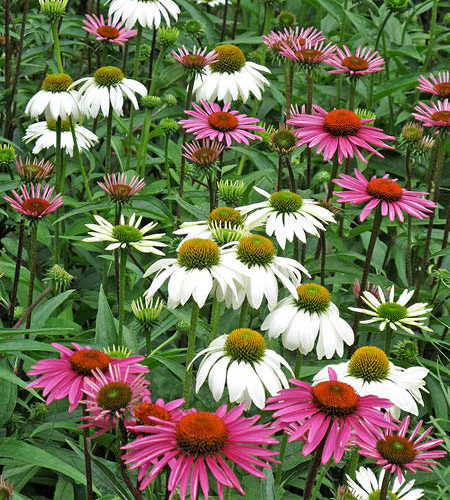A proven gardening technique, companion planting is Mother Nature’s own way of pest control. Former features editor Karien Slabbert shares some trade secrets on the benefits of companion planting

Benefits of companion planting: Echinacea is a great companion plant for peppers, brinjals, tomatoes, cabbage, broccoli, Brussels sprouts and cauliflower.
Companion planting (allelopathy) is based on the principle that certain plants can attract or repel insects and provide support to other plants, according to livingseeds.co.za. They produce higher yields and are better able to defend themselves against disease and insects.
READ MORE: Companion planting in the rose garden
Opposites attract
Group plants with complementary physical demands together. Moisture- and shade-loving plants can be placed beside taller, non-moisture loving plants.
Biochemicals
Many companion plants produce odours that confuse and deter pests, or their scent may mask or hide a crop from pests. A row of cabbages interplanted with marigolds suffers far less insect damage than when planted alone. Annual herbs like coriander, anise and mustard act as protective herbs when interplanted between rows of vegetables. The strong scents of parsley, garlic and marigolds are said to help keep pests away from roses.
READ MORE: 7 Natural ways to manage garden pests
Nutrients
Minimise nutrient imbalances by rotating your plants each year. Also consider nitrogen-fixing cover crops, such as legumes (beans, peas, and sweet peas), which return more nutrients to the soil than they withdraw.
Shelter
Use companion plants to provide food or attractive habitats for favourable insects, such as ladybirds and spiders that help control destructive pests in the garden. Basil, borage, dill, sage and thyme all attract beneficial pollinating insects.
Space
In some instances the height of a tall plant, such as maize can also disorientate pests that feed on low-growing plants like squash.
Traps
‘Trap’ crops draw harmful insects away from the plants you are trying to grow. Chives, garlic, marigolds, mint and coriander are all known to repel aphids, while radishes and nasturtiums draw beetles away from other plants.
Good to Know
Did you know that carrots and leeks are excellent counterparts? “Leeks repel carrot fly and carrots repel onion fly and leek moth. The confusion of scents chases the insects away,” writes herbal expert Margaret Roberts. Marigolds are good companions for everything.
The following vegetables do well when planted together:
- beans and potatoes
- peas and carrots
- peas and turnips
- cabbage and beets
- spinach and cauliflower
- spinach and eggplant
- maize and cucumbers
- maize and beans
- Responsible reading
Read The Garden Guardian’s guide to responsible garden care by Johan Gerber (Aardvark Press). In her book, Companion Planting (Briza Publications), Margaret Roberts lists more than 100 herbal and food plants and their companions.
Companion planting in action
Visit the Margaret Roberts Herbal Centre in Hartebeespoort to see what companion planting’s all about. Visit margaretroberts.co.za


